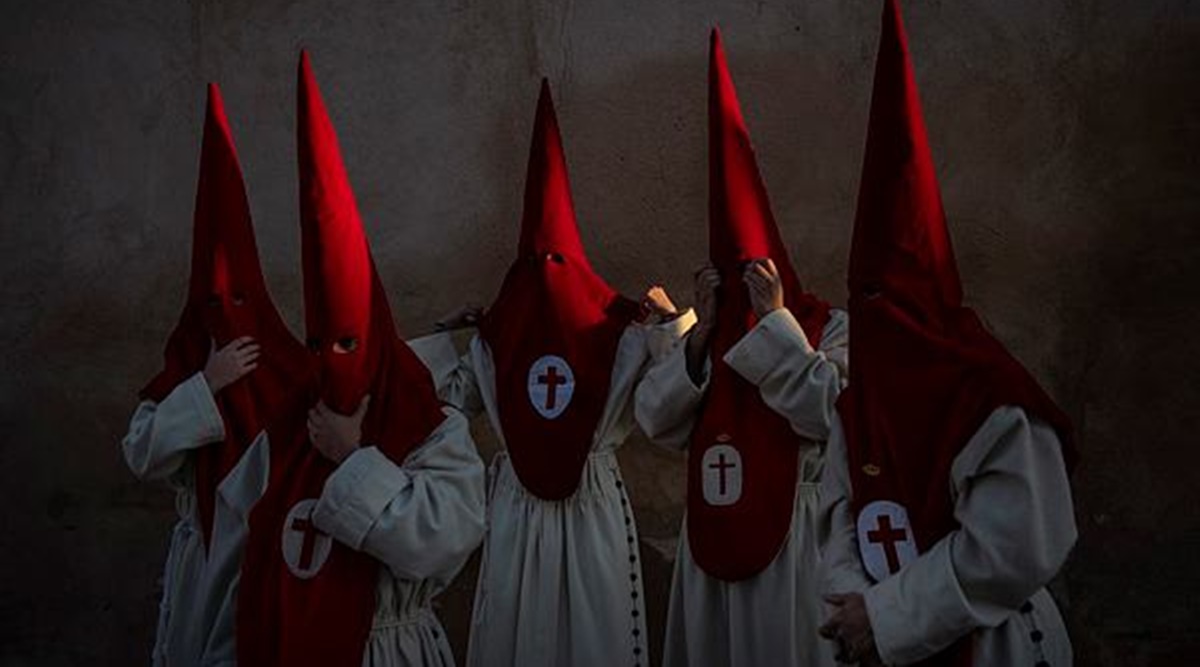 Penitents from 'Real Cofradia del Santisimo Cristo de las Injurias' also known as 'El Silencio' brotherhood gather prior a procession in Zamora, Spain, Wednesday, April 13, 2022. (AP Photo/Bernat Armangue)
Penitents from 'Real Cofradia del Santisimo Cristo de las Injurias' also known as 'El Silencio' brotherhood gather prior a procession in Zamora, Spain, Wednesday, April 13, 2022. (AP Photo/Bernat Armangue) Wailing bugles, rhythmic drumbeats and eerie religious chants can be heard once again across Spain this year as the country’s massively popular Easter religious processions return after a two-year hiatus because of the COVID-19 pandemic.
During Holy Week, hundreds of thousands of people are expected to again pack the streets of cities, towns and villages across the country daily to witness parades that are a major tourist attraction, with some televised nationally.
The ceremonies see brotherhoods of “nazarenos,” or penitents, with tall conical hats, monkish robes and facial hoods escorting magnificently decorated floats with sculptures of Jesus and the Virgin, many with a background of ancient streets and architecture.
Easter has always been a sacred holiday for Spaniards and millions take to the road, many just to see the processions. But COVID-19 halted all that.
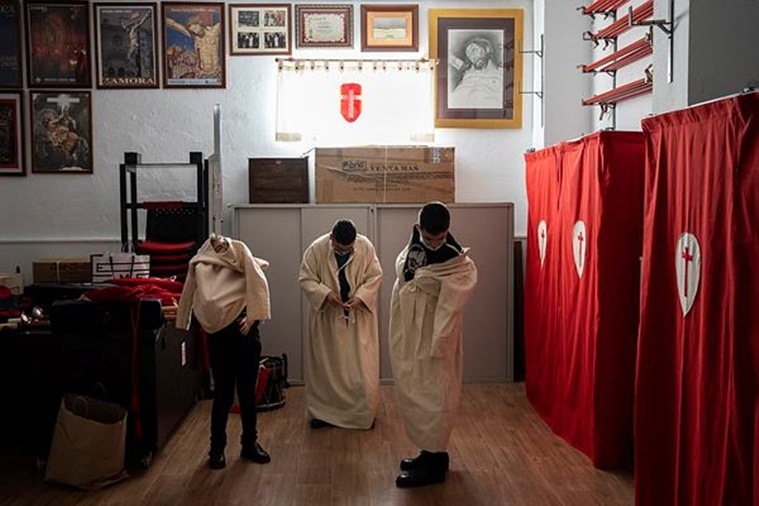 Penitents from ‘Real Cofradia del Santisimo Cristo de las Injurias’ also known as ‘El Silencio’ brotherhood get dressed prior a procession in Zamora, Spain. (AP Photo/Bernat Armangue)
Penitents from ‘Real Cofradia del Santisimo Cristo de las Injurias’ also known as ‘El Silencio’ brotherhood get dressed prior a procession in Zamora, Spain. (AP Photo/Bernat Armangue) The pandemic struck early in 2020 and Spain was in a total lockdown at Easter. In 2021, some measures were lifted but travel between Spanish regions was severely restricted and public gatherings banned.
Cristina Luisa Ensegundo, 29, is participating in her first Holy Week procession in the western city of Zamora. She is doing so in memory of her grandmother, María Carmen, who died from the coronavirus.
María Carmen had bought herself a veil and hair comb, which women participants use to adorn stylish black dresses but, her granddaughter said, she never got to walk in the procession.
“When we were sorting her things I saw the hair comb and veil and I knew that I had to join the procession,” Ensegundo said about the procession of the Virgin of Hope Brotherhood she participated in on Thursday.
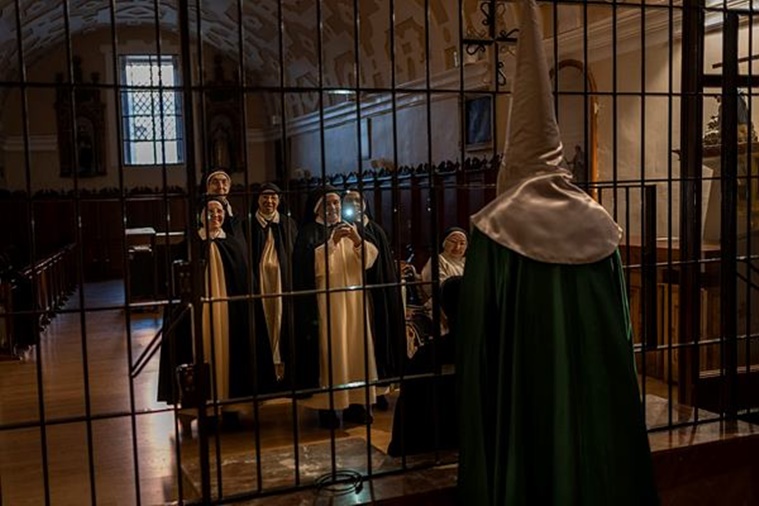 Catholic nuns take snapshots of a penitent from ‘Virgen de la Esperanza’ brotherhood in Zamora, Spain. (AP Photo/Bernat Armangue)
Catholic nuns take snapshots of a penitent from ‘Virgen de la Esperanza’ brotherhood in Zamora, Spain. (AP Photo/Bernat Armangue) “When she died I said this could be a homage or a way to remember her. Since she had always liked this procession I signed up” she said. “She is always with us, but this will make the day special.”
Nearly all pandemic restrictions are gradually being scrapped, but authorities urge the use of masks when necessary during the multitudinous gatherings, such as the processions.
While some women like Ensegundo do take part, men form the majority of participants. Processions vary greatly but nearly all include the hooded nazarenos. Their odd conical hats are said to date back to the Spanish Inquisition when prisoners were made to wear them. The covered faces helped sinners hide their identities.
The celebrations date back to when Spain was a bastion of Roman Catholicism, but nowadays nazarenos come from all walks of life, many with no religious inclination.
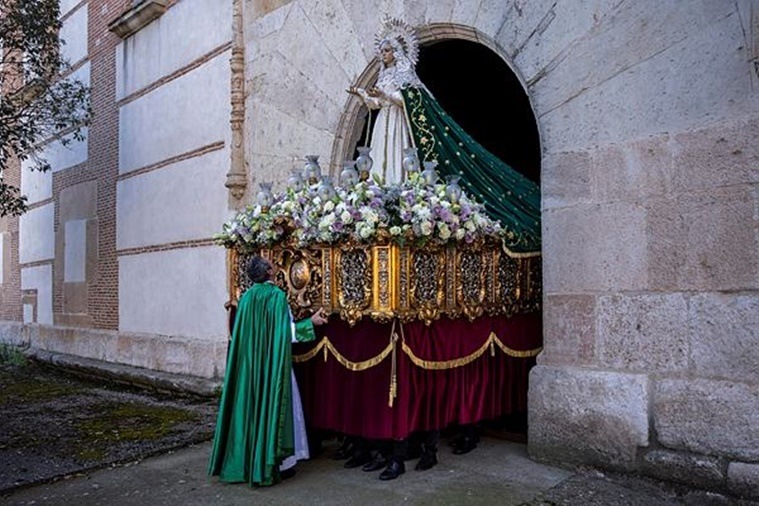 Penitents carry the ‘Virgen de la Esperanza’ carving during a procession in Zamora, Spain. (AP Photo/Bernat Armangue)
Penitents carry the ‘Virgen de la Esperanza’ carving during a procession in Zamora, Spain. (AP Photo/Bernat Armangue) For Juan Carlos Alonso, of the Jesus of the Stations of the Cross brotherhood, “the sensations today feel special,” adding that “Zamora lives the whole year for Holy Week.”
“For those who experience Holy Week to the full, these were two years of orphanhood,” said Alonso. He said that beside the religious and cultural aspects, the processions are of great sentimental importance, being “a tradition passed on from parents to children.”
Zamora’s processions date back to the 13th century. Beside the impressive artistic quality of the floats and sculptures, they are noted for their austerity, solemnity and captivating Gregorian music.
In the northern La Rioja region, many participants wear ankle chains and flagellate themselves. In nearby Aragon, nazarenos draw their own blood by beating bass drums for hours on end.
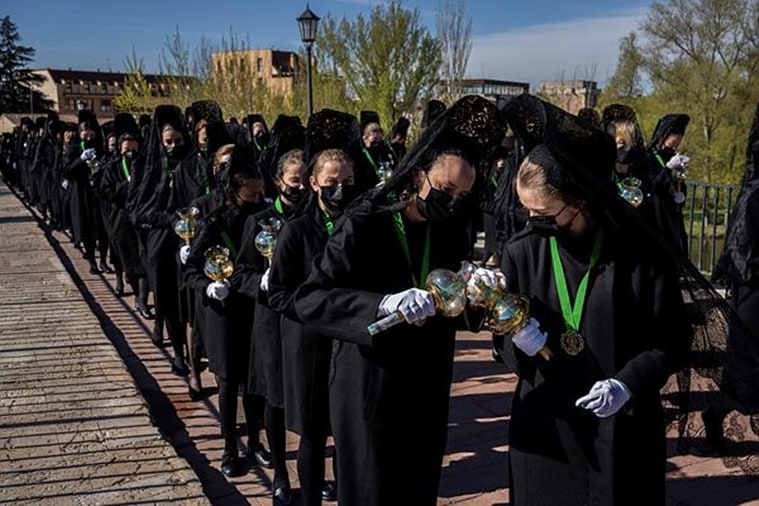 Penitents from ‘Virgen de la Esperanza’ brotherhood attend a procession in Zamora, Spain. (AP Photo/Bernat Armangue)
Penitents from ‘Virgen de la Esperanza’ brotherhood attend a procession in Zamora, Spain. (AP Photo/Bernat Armangue) Among the most fervent processions is Seville’s La Macarena, which features 3,600 penitents and attracts thousands of bystanders.
Many floats are extremely heavy and the Macarena has to be carried by 36 “costaleros” — normally men who wear corsets to avoid injury. Some processions are held in silence broken only by a flamenco-style lament, or “saeta.” Others have noisy brass bands playing festive “paso doble” dance tunes.
“The procession is of vital importance,” for people in Seville, José Antonio Fernández Cabrero, head of the Macarena brotherhood said. He described the past two years as “an existential void.”
📣 For more lifestyle news, follow us on Instagram | Twitter | Facebook and don’t miss out on the latest updates!
- The Indian Express website has been rated GREEN for its credibility and trustworthiness by Newsguard, a global service that rates news sources for their journalistic standards.

